- Home
- Grace Thompson
Unlocking the Past Page 6
Unlocking the Past Read online
Page 6
They were getting into the van, scrubbing the worst of the mud from their boots in the grass when a man came along with a dog beside him.
“Been to look at the view?” he asked. “Not many go that way now, so it’s very overgrown.”
“We were looking for Spring Cottage. My sister lived there many years ago, but it’s a ruin now.”
“Lost her have you?”
“Lost touch more years ago than I like to count.” Janet lifted Joseph into the van and added, “Too long to have a hope of finding her again. She’d be seventy, if she’s still alive.”
“If she lived round here why don’t you put a notice in the post office? Someone might remember. There are plenty of old dears long past that age.”
“What a good idea. Oh, I can’t, at least, not today, it’s closed.”
“Give me your name and I’ll do it for you. Cost you threepence mind.”
Expecting to lose the money and have the advertisement forgotten, Janet nevertheless wrote a message on an old envelope and handed it, with the coins, to the man. He tucked it in his pocket, whistled for the dog, and walked on.
“That’s sure to be a waste of money but it was worth risking threepence,” she explained to Caroline. “Don’t tell your father, he’ll call me all sorts of a fool.”
“Forget all about it. That’s best.”
They said little on the journey back until they reached the outskirts of the town, then as they turned down the lane that lead to the back of the cottage, Janet said, “About you coming back, love. Will you leave it for another month or so, see what happens? I know you’re unhappy, and that worries me. But if you abandon it all without giving yourselves a chance you might regret it for years to come. My old mother-in-law used to say it’s lonely not having someone to share the good as well as the bad.”
“Better alone than unhappy together.”
“Does it have to be one or the other? Barry isn’t unkind and certainly not uncaring, is he?”
“No.”
Janet noted that the word was elongated, a hint that the answer was not completely truthful perhaps.
As the van stopped and the engine fell silent, Janet looked out at the lighted house in front of them. Hywel came out and was silhouetted against the glow from within. Barry stepped out and stood beside him. Janet patted her daughter’s arm and said softly, “It’s nice to look across and see someone who’s looking at you, knowing they care.”
“When I look across at Barry, his eyes are staring far away from mine.”
“Love is worth a bit of a fight though, even when the battle seems to have been lost, love.”
“Is that another of your mother-in-law’s wise sayings, Mam?” Caroline laughed.
“All right; I admit it. I made that one up too!”
Seeing Caroline laugh was worth putting up with a bit of teasing.
* * *
In the overcrowded terraced cottage in Goldings Street, Jack Weston was pleading gently with Victoria.
“If we’re to be married in August, we have to make plans.”
“I go to see your mother with all the best intentions, Jack, but once she and your grandmother start discussing colours and seating arrangements and etiquette, and the rights and wrongs of every little thing, my mind closes up and I leave them to it. Then they ask me a question and I pull myself out of a daydream of a quiet wedding with just a few friends and ask them to repeat what they were saying, and they’re convinced you’re marrying an idiot!”
Jack laughed but he could see that Victoria was genuinely worried, and said so.
“Worried?” she exclaimed. “More than worried, Jack. I find it all terrifying.”
“We can’t have this. There must be a better way of handling what should be the happiest day of our lives.”
“Perhaps I should go and talk to your cousin, Megan? She might help me with the dresses. Hers and Joan’s and mine.”
“Good idea. We could go now.”
Mrs Jones was upstairs getting the younger children to bed. They could hear her soft voice telling a story which was punctuated by laughter. The older boys were out in the street playing football in the light from the solitary street lamp, the thump of the ball against the house a reminder that they were due to come in for the night.
It was apparent that his bride-to-be was not enthused with the idea of visiting his cousins, but he gently persuaded her.
“They’re all round at Grandmother’s this evening. We were all invited to dinner but I declined for both of us. I hope you didn’t mind, but I couldn’t face it.”
“It wasn’t that you couldn’t face it with me there, was it?”
“You know it isn’t!”
“I do try to fit in but it’s hard for me not to get up and start clearing the dishes,” she laughed, and he joined in, hugging her and telling her how happy she made him.
After a clear April day the night was crisp with frost and they ran through the empty spaces where Philips Street had stood, and up onto the main road. Still walking briskly, they stopped twice to shelter in a shop doorway and enjoy a kiss. When they went into Arfon and Gladys Weston’s big house overlooking the docks, they were rosy-faced and with eyes that were bright with love.
For Victoria the worst was always the first few moments. Once she had deposited her coat and found somewhere to sit, she relaxed a little, confident that Jack wouldn’t leave her to the mercy of his grandmother’s carefully veiled put-downs.
The conversation began between herself and Jack telling the others what they wanted for the wedding day but from then on, the words flew around the room, ideas offered by Gladys, picked up and rearranged by Jack’s mother and aunt, and his cousins Joan and Megan, before being presented to her again. Only for her to glance at Jack and for them both to shake their heads.
When they left two hours later nothing had been decided and the only progress was that Victoria had arranged to meet Joan and her mother Sally and the formidable Gladys, in Gwennie Woodlas’s shop on the following day.
“I wish,” Victoria said with deep dismay, “that they would allow my mother to arrange a quiet wedding.”
“The Westons? Gladys Weston? Can you imagine Grandmother arranging a quiet anything? There’s not a chance. We’ll just have to grin and bear it, love.”
“Then let’s make it sooner than August and get it over with.”
“August is when the school closes. I don’t want us to bring it forward, rush it, fit it in over a weekend.”
He was thinking more about his plan to get a house bought and ready for them to return to after their honeymoon, but that was to be a surprise and couldn’t be included in the general discussion. “No,” he smiled, “we’ll go along with it all and stamp on anything too outrageous.”
“All right. There doesn’t seem to be an alternative, does there?”
“I have some good news. I didn’t want to tell the family in case they try to get involved in that, too, but on Saturday we are going to look at that house we saw for sale. It’s going for eight hundred pounds and I think we can afford it.”
“And we’ll look at it together? Just the two of us?”
“Just the two of us,” he smiled.
“And furnish it together?”
“Just you and me, with Basil’s help no doubt.”
“You are wonderful, Jack.”
“And so are you.”
The house was in Gethyn Street leading on from Trellis Street where Jack’s parents now lived. A turning off Brown Street, it ran behind Sophie Street, convenient for shops, the school where he worked and not far from Victoria’s mother.
Before Jack went home, they walked down Goldings Street, across Brown Street and along Gethyn Street to take another look at it, then they both went home, to dream their dreams.
Chapter Four
Frank and Ernie Griffiths were more like twins than cousins although Frank was in fact, at twenty, two years younger than Ernie. Ernie had arrived on the Griffiths’s door
step one dark winter night, carried in the arms of a policeman. His mother and father had been killed and there was no other family to give a home to the child who was then only five years old. Janet and Hwyel had shared the merest glance before taking the boy and promising him a place in their family. Since then, Ernie and Frank, who was then only three years old, had been inseparable.
Janet had not found it easy. Ernie was a disrupting influence and having him as a close friend brought out the worst in Frank. Ernie led the younger boy into every imaginable trouble. One of their earliest escapades was stealing washing from the gardens of the houses in the town and hanging it on someone else’s line. Missing school the following day, they had spent happy hours watching from the hedges and fences as irate neighbours lost, then found their possessions, and accused each other of theft and a wide variety of deviant habits.
As the boys grew up their roles changed and it was Frank who had ideas and planned their various forays into petty crime, and Ernie who willingly followed.
Stealing came naturally to them and from small beginnings, like a few sweets from Temptations during the time Nia’s mother ran it, they followed a steady and varied course: taking friends’ toys, and small, often unwanted items, graduating to items they could sell. At a time of shortages there were people only too willing to buy without asking questions about ownership. One of their favourite scams was catching cats and dogs and holding them for a few days before returning them to their owners, and bashfully accepting a reward.
Their career reached a high spot when they stole a sheep, which they took to a distant market and tried to sell. This was when they were twelve and ten years old, by which time the police knew them well.
Frank, being tall and, like his brother Basil, unbelievably thin, looked so solemn and so full of remorse he usually achieved a light sentence while Ernie, who was sharper and argumentative, invariably caused the magistrate to increase his punishment. At present, they were in court on a charge of driving a van without consent and without insurance.
Frank was all for pleading guilty and looking ashamed, but Ernie insisted on telling the court he had mistaken the van for their own. The Griffiths’s van and the one the boys had “borrowed” were ten years different in age and several layers of amateurish paint more scruffy. They each had a heavy fine.
* * *
They were fishing on a sandy bay using two beach rods each hoping for a late cod or an early bass, thinking about their latest fine. Both looked utterly fed up.
“We’ve got to earn some money fast, Ernie, if we’re to pay it off without our Dad finding out,” Frank sighed as he pulled his line out of the water and examined the chewed up lug-worm. “And catching fish to sell to the fish shop isn’t the way to do it.”
“You’re right. Hours we’ve been hanging about here and we haven’t caught a damned thing,” Ernie frowned. Then he suggested, “Time we went out with the van I think. Our Dad’ll lend it us, won’t he?”
“Unless he’s still mad about the crunch we gave it last time. What did you have in mind?”
“For a start off, there’s manure up at the farm going for practically nothing and the allotment holders are starting to dig.”
Abandoning the fish and throwing the bait into the waves, they walked back home and pleaded with Hywel to lend them the van. Promising to clean it after use, which they assured him was “only a few bricks and things,” they set off for the allotments. It took less than an hour to take orders for barrow loads of manure and only three more to collect and deliver the stuff, making a profit of a little over three pounds.
“Put it straight in the kitty to pay the fine, is it?” Frank said.
“Dad isn’t expecting the van back just yet. I saw a load of sawn tree trunks just inside the gate of the wood waiting to be collected. Just begging to be ‘lifted’ it is. What say we fill the van with that? We might make another pound or two?”
At seven o’clock, tired and filthy, the two of them walked into Janet’s kitchen and were spun around by her small hand on their shoulder to walk straight back out again to wash at the pump and take off their smelly clothes.
“And wash out that van!” Hywel demanded. “Bricks you told me. Since when did bricks smell like sh—”
Janet “shushed” him just in time and reminded him that Joseph was still there.
“Still no sign of your Barry, love,” Janet said as she took the drowsy little boy from her daughter to give her arms a rest. “I wonder what’s keeping him?”
“Can you give us a lift home, Dad?” Catherine asked. “It’s way past Joseph’s bed time and he’s ready to drop.”
The van smelled far from sweet but with the back doors tied open and the windows down, they suffered the cold night air and survived the ride to Sophie Street. The lights of the flat were on and Caroline frowned. “It looks like Barry’s home. He can’t have forgotten he was collecting us, can he?”
“No, of course not,” her father said. “As if he’d do that. Though he might be working on something and forgotten the time,” he conceded.
“Yes, he does do that sometimes.” Catherine sighed, and Hywel hugged her.
“Lucky you are to have a man who works for you as hard as your Barry does.”
“Yes,” she said, but she didn’t sound convinced.
Barry was full of remorse for forgetting he had promised to collect Caroline and Joseph, he didn’t try to cover up his neglect with a lie and Hywel teased him about his memory.
“He has a good memory really, Dad,” Caroline said softly. “I’ve never known him forget an appointment where work is concerned. It’s just that work takes other things out of his mind.”
“Come on, that makes me sound like a terrible husband,” Barry laughed. “You and Joseph aren’t ‘other things’, for heaven’s sake!”
“Of course we aren’t,” she smiled stiffly. “Now, come on, Joseph, let’s get you to bed, shall we? Or you’ll never be up in the morning.”
Hywel left a few moments later more than a little concerned.
“What’s the matter with Barry, forgetting he had to collect our Caroline and the baby!” he stormed as he entered the kitchen where Janet was wiping hens’ eggs and placing them in a basket. “Sitting there reading, he was. Tried to hide the book, but I saw it. Where did he think they were? Did he care?”
Janet put the last egg down with care then told Hwyel all that Caroline had confided to her.
“I don’t think they should be living there, in the flat she was planning to live in with Joseph. If they had a proper home, or gone anywhere else but that place they’d have stood a better chance.”
“What’s that got to do with him forgetting his wife and son?” Hywel threw off his boots and wiggled his feet around searching under his chair for his slippers. “If I came home and you weren’t here, I’d wonder why. Find out where you were.”
“Seems to me they’re drifting further and further apart, Hywel.”
“And we thought everything would be perfect once they had started life as a real married couple.”
“Perhaps it still could,” she mused, “in the right place.”
“There must be somewhere for them to rent. Both working they could afford somewhere decent. Why didn’t he think things out and give our Caroline a proper home?” He stood up and looked out at the extension to the house formed by the shed, where Frank and Ernie slept. “Pity we can’t get rid of them two buggers and let our Caroline and Barry use the shed.”
“You couldn’t expect anyone except our Frank and our Ernie to sleep in a place like that! Besides, that would be coming home to Mam, and that isn’t a solution either.”
“I saw Jack Weston and that Victoria Jones today,” Hywel said a while later. “Getting married in August, soon after Viv Lewis and Joan Weston. Pity ’elp the girl. Imagine getting yourself related to Gladys Weston! Looking at a house in Gethyn Street they were, the end bit that wasn’t knocked down.”
“They could hardly be looking
at the bit that was knocked down you idiot!” She laughed and he joined in as the door opened and Frank and Ernie came In.
“You two are always laughing,” Ernie said. “What’s your secret? How have you stayed happy together all these years?”
“We live how we want to live, we listen to each other and not other people, and, we love each other,” Hywel surprised himself by stating.
Janet stood to put the kettle over the fire and kissed him as she went past. “I’d have said the same,” she said smiling.
“Why are you asking about wedded bliss, our Ernie?” Frank asked suspiciously. “Not seen a girl you fancy have you?”
“Don’t be stupid!”
Ernie turned away, afraid Frank would see the lie on his face. He had met Helen Gunner several times without any of his family knowing and he was beginning to think it was time he confessed. But not yet. He had to tell Mam and Dad and Caroline first, so they would help him cope with Frank’s teasing.
* * *
Frank was suspicious that Ernie was up to something but he hadn’t considered a girlfriend, apart from in jest. He suspected he was involved in something planned by Percy Flemming.
Percy was a man few could call friend. A solitary man, rarely seen in The Railwayman’s or any other public house, who spent most of his time at home, with his common-law wife and their daughters. Outwardly respectable, he worked as an assistant gardener in a local hospital but it was rumoured that his real income derived from burglaries. Although he had been questioned many times, he had never been found guilty. Frank hoped that Ernie had not become involved, because if something went wrong and someone were caught, it would not be Percy Flemming.
The reason Frank was suspicious, was partly due to Ernie’s evasive attitude towards him, when they had always shared every thought. And partly because Ernie had borrowed the van a few times without explaining why he needed it. Once, Frank had been walking home from The Railwayman’s alone, Ernie having left early and without giving him the chance of following him. He waved as the van approached, expecting a lift, but if Ernie saw him he pretended not to, increasing his speed along the dark lane and out of sight. Later that evening, when Frank had complained, Ernie had denied being the driver.

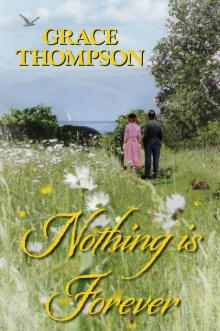 Nothing is Forever
Nothing is Forever Friends and Secrets
Friends and Secrets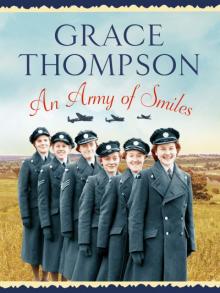 An Army of Smiles
An Army of Smiles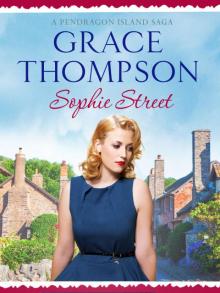 Sophie Street
Sophie Street Gull Island
Gull Island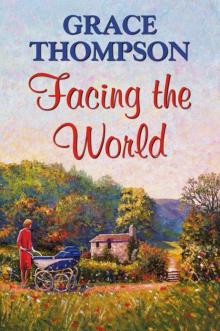 Facing the World
Facing the World The End of a Journey
The End of a Journey Unlocking the Past
Unlocking the Past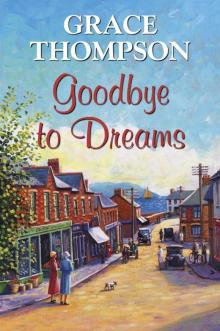 Goodbye to Dreams
Goodbye to Dreams The Weston Girls
The Weston Girls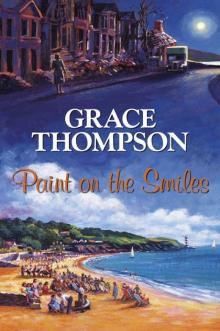 Paint on the Smiles
Paint on the Smiles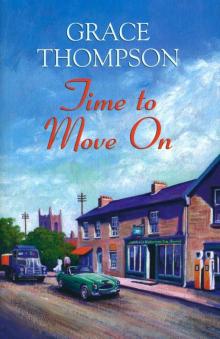 Time to Move On
Time to Move On The Runaway
The Runaway